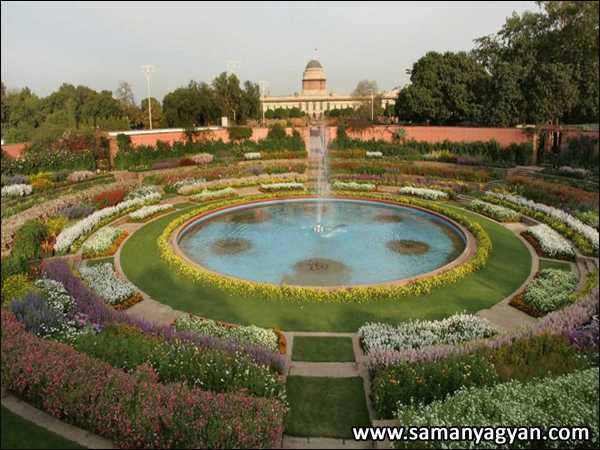Mughal Garden Quick Facts
| Place | Delhi, India |
| Built in | 1912 AD - 1929 AD |
| Type | Garden |
| Architect | Edwin Landseer Lutyens |
Mughal Garden Overview
The Mughal Gardens are located at the rear of the Rashtrapati Bhavan at the western end of the Rajpath in New Delhi, the capital of the country. Rashtrapati Bhavan is covered over 130 hectares (320 acres), which includes this vast garden.
Here you can see beautiful colorful flowers from all over the world. In this garden, a glimpse of the Mughal style along with the English style can be clearly seen. This garden opens for tourists every year in the spring season i.e. in the month of February. This garden is one of the most important historical parks in Delhi.
Mughal Garden History
When the British changed the capital of the country from Calcutta to Delhi in the year 1911, they called the famous British architect Edward Lutyens from England to India to give a new look to Delhi.
After coming to Delhi, Lutyens choose Raisina Hill for the Viceroy's House (present-day Rashtrapati Bhavan) and prepared a map, which included a British style garden along with the building.
Lady Hardinge, wife of the then Viceroy Lord Hardinge, had seen Nishat Bagh and Shalimar Bagh in Srinagar which had attracted her attention, when she proposed to build an Indian style garden here. Sir Edwin Lutyens had great respect for Lord Hardinge, so he redrawn the map according to his suggestions. The construction of the Viceroy's House was started in the year 1912 and it was finalized by 1929 AD.
Mughal Garden Interesting Facts
- Located in the rear part of the Rashtrapati Bhavan complex, this garden is covered over 13 acres.
- The Mughal Gardens have 4 waterways, built at their intersection with a lotus-shaped red sandstone fountain.
- There are many small and big gardens like Pearl Garden, Butterfly Garden, Circular Garden, etc.
- The largest part of this garden is called Peace the Resistance. Whose length is 200 m. and width is 175 m. Is. It has terrace gardens on its north and south and a tennis court and long garden on its west.
- A herbal garden is also present inside this garden, about 33 herbal herbal plants are found here.
- In this garden, you can see about 10000 plants of eight varieties of tulips together.
- Apart from this, 70 varieties of seasonal flowers and about 300 dwarf plants (bonsai) of 50 varieties are also found here.
- Here two canals and two canals flow from north to south and from east to west, in the middle of which there are 6 lotus-shaped fountains at the confluence. These canals divide the garden into four parts.
- From these Fountains, the stream of water rises up to a height of 12 feet.
- This garden is divided into four parts on the basis of structure:- quadrilateral shape, long garden, curtain garden, circular garden, etc.
- Lawns are covered with 'drowning' grass which was originally brought from Belvedere Estate, Calcutta when they were initially kept.
- After the country's independence in 1947, the name of the Viceroy's House was changed to Rashtrapati Bhavan.
- More than 250 varieties of roses are found in this garden, including seed nuts and Oklahoma. The color of Oklahoma rose flower is almost black.
- The species of blue roses here include Paradise, Blumoon, and Lady X, apart from this you can also see green-colored roses here.
- Here Calendula Antirrhinum, Brassicum, Metucheria, Verbena, Alyssum, Dimorphotheca, Mesembryanthemum, Assolzia, Larksper, Gazzanias, Gerbera, Godetia, Linearia, Viola, Pansy, Stock and also large number of winter bloomers like dahlias, carnations and sweetpies are also found here. goes.
- More than 300 permanent and casual staff are currently deployed for the development and maintenance of the Garden of Rashtrapati Bhavan.
- This garden is opened for tourists every year during the Udyanotsav in February-March from 9:30 am to 5 pm, but entry is available only till 4 pm. This garden is open on all days except Mondays.
- Entry to this garden is free but you cannot take the bag, big ladies purse, umbrella, water bottle, and food items with you.

